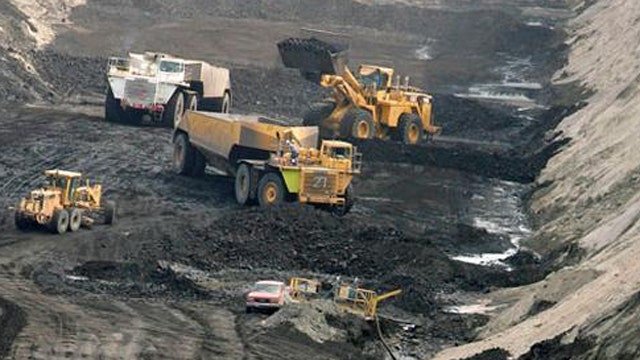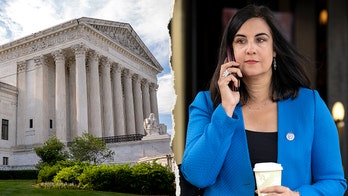Power Play 6/25/2013
World ignores Obama coal war, The Senate ends the debate on immigration bill and Supreme Court rulings
"We can't drive our SUVs and eat as much as we want and keep our homes on 72 degrees at all times ... and then just expect that other countries are going to say ‘OK.’ That's not leadership. That's not going to happen.”
-- Then-Sen. Barack Obama at a campaign rally in Oregon, May 17, 2008.
World leaders don’t seem to be paying much heed to President Obama. And not just when it comes to domestic spy leaker Edward Snowden’s ultimate destination.
Obama today will announce what promises to be a hammer blow to cheap, coal-fired electricity as part of his legacy project of curbing global warming. But as Obama prepares to deliver what U.S. environmentalists hope will be a knockout punch to coal power here, the rest of the world is gobbling up every coal BTU it can get.
U.S. carbon emissions dropped last year more than any other major industrialized country, due in substantial part to the first round of Obama’s EPA regulations (aided by cheaper natural gas from Obama-approved fracking and a perpetually sluggish economy).
Meantime, China, India, Russia and other growing economies were firing up the coal furnaces. In the last decade, global carbon output increased by 2.6 billion tons beyond anything emitted in the United States, according to BP’s latest global survey on energy and the environment.
Obama and new Secretary of State John Kerry say they remain committed to making the U.S. a signatory to a U.N. carbon treaty. As unlikely as that may be in the U.S. Senate, it looks even more unlikely given the tendencies in other major emitters. President Putin of Russia and President Xi of China seem especially unlikely to do anything that would slow their domestic growth to levels seen in places already under a carbon crackdown like the U.S. and Europe.
But Obama, who as a candidate promised to “bankrupt” power companies that rely on coal power, will today make good. This action, he says, will set an example for the other nations to follow.
The courts and the voting public have blocked Obama from delivering any of his comprehensive plans on carbon dioxide, which he and many others attribute to an increase in global temperatures prior to the late 1990s.
Global temperatures have been steady for the last 15 or so years despite massive increases in carbon dioxide output. Climatologists who believe mankind is driving climate changes are looking for ways to explain why warming has stalled despite forecasts that the past 15 years would bring catastrophic warming. Their models have so far proved incorrect.
But those extremely alarmed about carbon, including Obama, argue that the consequences are still seen in severe weather events like hurricanes and tornadoes.
Obama, who is working hard to shore up his political base after revelations that he hugely expanded secret domestic surveillance programs, may not be able to impose federal fees on carbon emissions or regulate carbon dioxide as a toxic substance as he previously tried to do, but he still may be able to make electricity so expensive that his preferred green alternatives (especially given heavy federal subsidies) will be cost-effective.
[pullquote]
This effort will be even more important to Obama’s shaky political fortunes if he, as expected, accedes to pressure from business and labor groups to authorize a pipeline to bring Canadian oil to American refineries. Environmentalists are howling over the project that they say will increase U.S. complicity in climate change. Obama needs something to offer these folks, already unhappy to find out the size of his domestic spy regime, if he really is going to cave on Keystone.
Obama doesn’t need Congress to cripple carbon. By expanding the EPA’s standards for new plants to existing plants, Obama will hasten the conversion to fracked natural gas by utilities. Even though the programs will take time to implement and face legal challenges, power companies have long seen the writing on the wall and are already switching to more expensive fuels. The conversion and the price increases due to heightened demand will accelerate.
The idea here is for Americans to pay the price to show a moral example on climate to the rest of the world. It’s not that it will make much difference to the composition of the atmosphere but that previously reticent nations will want to follow suit.
But as it turns out, the world doesn’t much care about America’s carbon footprint. For most of the planet’s 7 billion residents, the question is how they are living, not what the United States is emitting. Add to that the mounting questions about climate science and it is hard to see Putin and others jumping on the bandwagon of more expensive energy.
Today’s announcement will be more good news for the president’s patrons and political partners in the green energy and natural gas businesses who have already benefited hugely from his policies. But as far as changing the planet, its looking like a great big “nyet.”
And Now, A Word From Charles
“The fact that people don’t like the United States is not new. What’s new is that these non-likers have no respect for the United States.”
-- Charles Krauthammer on “Special Report with Bret Baier.”
Chris Stirewalt is digital politics editor for Fox News, and his POWER PLAY column appears Monday-Friday on FoxNews.com. Catch Chris Live online daily at 11:30amET at http:live.foxnews.com.













































